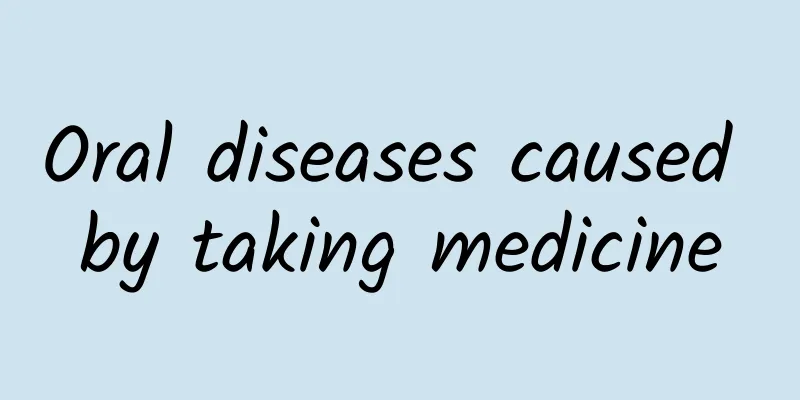Oral diseases caused by taking medicine

|
What is medicine? It is used to treat diseases! But sometimes, medicine can cause diseases! Some oral diseases are caused by taking medicine. The most familiar drug-induced oral disease is probably tetracycline tooth that was popular many years ago. But in fact, there are more than one oral disease caused by taking medicine. So today we will talk about those oral diseases related to medicines. 1. Acid erosion Erosion is a type of tooth wear (TW). It is defined as the irreversible loss of tooth structure due to chemical dissolution initiated by acids of non-bacterial origin . The most common cause of erosion is exposure of teeth to acidic foods such as alcohol, juices, carbonated beverages, etc. Similarly, many acidic drugs, such as chewable vitamin C tablets, aspirin and some iron preparations, may also cause erosion. In addition, certain medications that cause hyposalivation (low saliva quantity or quality) are also considered risk factors for erosion because these medications weaken the buffering effect of saliva on the oral environment and thus weaken the protective effect of saliva on teeth. Of course, the direct consequence of insufficient saliva secretion is dry mouth, which can lead to a series of oral health problems, including but not limited to erosion, tooth decay, bad breath, oral candidiasis, burning mouth syndrome, etc.
2Drug -induced gingival hypertrophy Not only teeth can be affected by drugs, but other oral tissues and organs may also be affected by drugs. The gums are a typical example, and the gum disease caused by drugs is called drug-induced gingival enlargement (DIGE) .
The three commonly used drugs related to DIGE are: ① anti-epileptic drugs - phenytoin sodium; ② immunosuppressants - cyclosporine, which are often used in patients with organ transplants or certain autoimmune diseases; ③ calcium channel blockers , such as nifedipine and verapamil, which are mainly used to treat cardiovascular diseases. Therefore, once patients using the above-mentioned drugs are found to have gingival hypertrophy, it is recommended that on the one hand, good oral hygiene measures be taken to try to remove local irritants that cause gingival inflammation; on the other hand, consider discontinuing the above-mentioned drugs or replacing them with other drugs. As mentioned before, there are many more oral diseases caused by drugs than these, which will be discussed later! |
<<: The child is actually asking you for help when he/she makes faces and acts naughty.
Recommend
The heart is most vulnerable in winter. How can we spend the winter smoothly?
《Cotton Swab Medical Science Popularization》 Yang...
New super comprehensive food nutrition score, beef and cola scored so low?
Food Compass is mainly used to comprehensively ev...
What are the symptoms of postmenopausal women?
Most female friends gradually stop menstruating a...
How long can I eat sea cucumber during pregnancy?
After pregnancy, women usually need to pay specia...
Spring health care liver care first
Spring health care liver care first Tongling Trad...
Precautions after HIFU surgery, postoperative care for cervical disease
HIFU surgery is an advanced treatment method for ...
What kind of exercise in late pregnancy can help with normal delivery?
If the pregnant woman is preparing for a normal b...
Causes of large amounts of vaginal blood clots during menstruation
We all know that it is normal for women to bleed ...
Why does it hurt for women to urinate?
In daily life, there are always some minor illnes...
What is the physiological reaction of girls?
Do you understand the physiological needs of girl...
What should I pay attention to when I am pregnant 5 months after cesarean section?
Nowadays, cesarean section has become the method ...
Causes of gonococcal infection in women
After suffering from gonococcal infection, female...
What should I do about amenorrhea? I am only 22 years old.
Amenorrhea in young women must be taken seriously...
What should I do if I drink Pu'er tea during my period?
There are many things that women need to pay atte...
Will long-term constipation make women gain weight?
Patients with frequent constipation are also pron...









